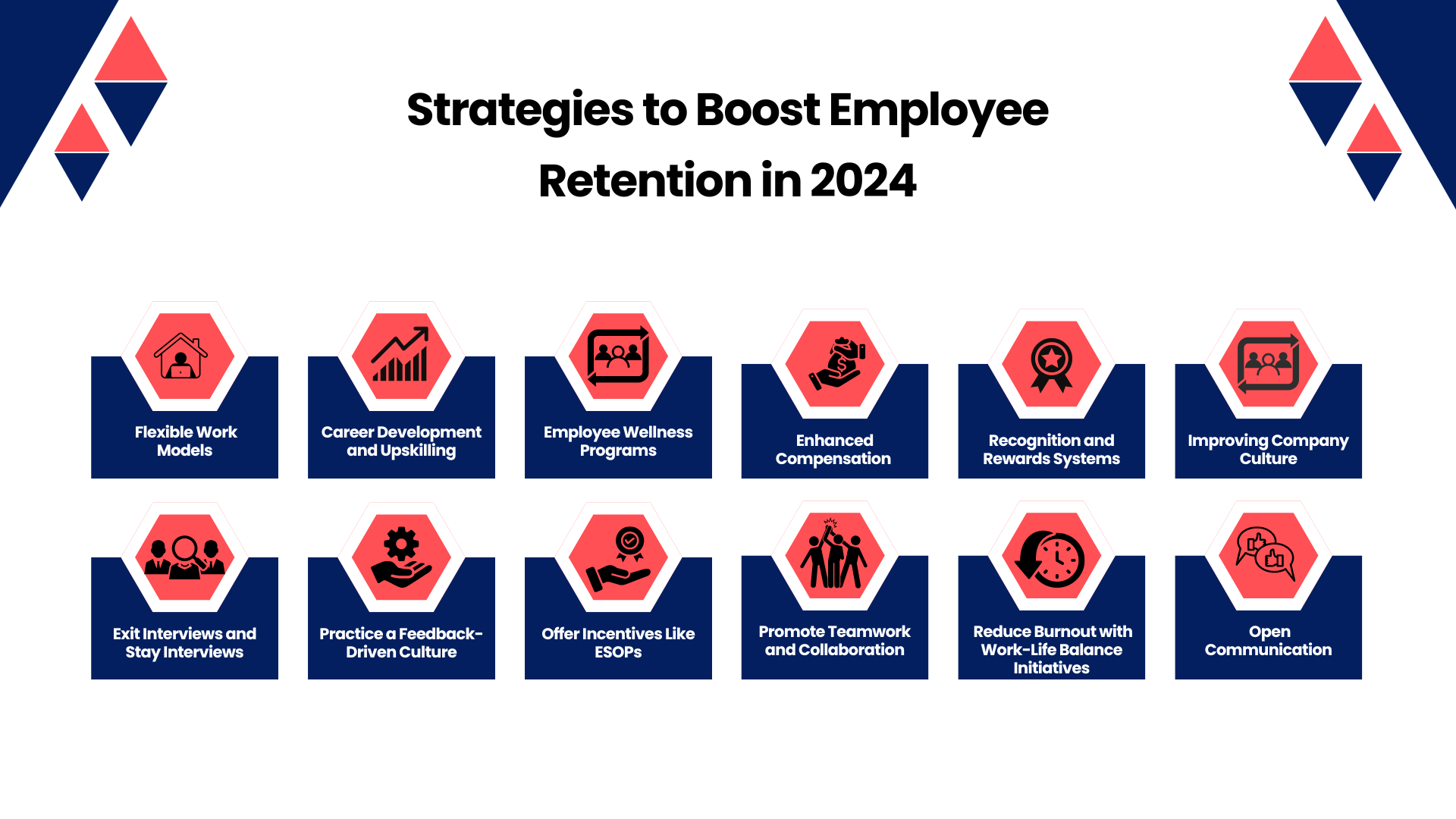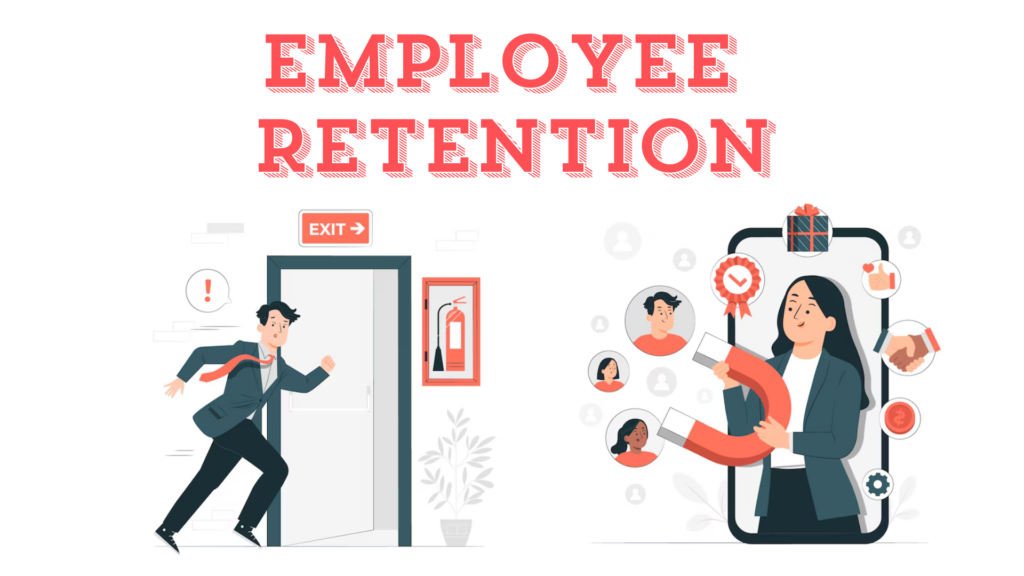In today’s competitive job market, keeping your top talent engaged and happy is more important than ever. It becomes a much tougher task to ensure that the good employees of your organisation remain productive and satisfied in the modern world of increasingly difficult job search. Employee retention strategies for now and more so in 2024 has become dynamic owing to factors such as the adoption of technology, flexibility in working and also the health of the Employee.

What is a Retention Strategy?
Employee retention focuses on implementing strategies that minimize turnover and keep top talent by promoting a positive work environment, providing competitive pay, and encouraging career development. Such efforts help build a stable, skilled workforce that drives organizational success
Employee retention is the key to several reasons.
- Saving Cost: Replacing an employee can cost as much as 50-60% of annual salary because of hiring and training expenses.
- Knowledge Retention: The long-service employees possess organizational knowledge that is critical for maintaining continuity and productivity.
- Company Culture: Company culture suffers when there is high staff turnover, as it lowers morale and productivity.
- Customer Satisfaction: Consistent performance in the workplace better develops relationships with clients and customers; therefore quality service delivery is enhanced.
By looking at retention, companies can create an effective, committed workforce that contributes to long-term business success.
Winning Strategies to Boost Employee Retention in 2024

- Flexible Work Models
With remote work becoming mainstream, offering hybrid work models or full remote work options is essential for retaining employees. Flexible schedules can improve work-life balance, reducing burnout and increasing job satisfaction. - Career Development and Upskilling
Investing in employee development programs, mentorship, and career growth plans is a key retention driver. Providing continuous learning opportunities, such as HRMS-integrated training modules and upskilling, shows employees that the company values their personal growth. - Employee Wellness Programs
Companies are focusing on both mental and physical health by offering wellness initiatives such as mental health days, stress management workshops, and fitness benefits. This holistic approach to employee well-being has a direct impact on retention. - Enhanced Compensation and Benefits
Competitive salaries, along with customizable benefits packages, are essential in today’s job market. Offering benefits that cater to individual needs, such as parental leave or financial wellness programs, makes employees feel valued. - Recognition and Rewards Systems
Employee recognition platforms integrated with HRMS systems, where managers can acknowledge and reward high performers, can significantly boost morale. Recognizing effort is crucial for making employees feel appreciated and less likely to leave. - Improving Company Culture
A positive work culture that promotes collaboration, transparency, and employee engagement ensures that workers feel a strong sense of belonging. HRMS toolkit can be used to gather feedback and improve workplace environments based on employee needs. - Exit Interviews and Stay Interviews
Conducting stay interviews allows companies to identify why employees choose to stay and what could be improved. On the other hand, exit interviews help companies understand what drives employees to leave, offering insights for future retention strategies. - Practice a Feedback-Driven Culture- Foster open communication by implementing regular feedback cycles. When employees feel heard and valued, engagement and retention rise. Continuous feedback also helps address concerns before they lead to disengagement.
- Offer Incentives Like ESOPs
Empower employees by offering ownership through Employee Stock Option Plans (ESOPs). This not only aligns their goals with company success but also creates long-term loyalty, boosting retention. - Promote Teamwork and Collaboration
Encourage strong team dynamics through collaboration tools and regular team-building activities. A sense of belonging and support within a team increases job satisfaction and keeps employees invested in the organization. - Reduce Burnout with Work-Life Balance Initiatives
Address the growing issue of burnout by promoting work-life balance through flexible hours, remote work options, and mental health support. Companies that proactively prevent burnout see higher employee engagement and lower turnover rates. - Open Communication
Encourage open communication between employees and management to address concerns and build trust.
Critical Factors Behind Employee Departures You Must Know
This year 2024, there are a number of reasons why you sustain such high employee turnover:
- Lack of Job Advancement
Employees will quit if they believe that they are not making the progression they are looking for in their jobs. Lack of opportunities for advancement breeds demotivation.
- Overwork and Burnout
The pressure on employees to be constantly “on the move” in today’s remote workforce has led to its fair share of burnout by employees that is leading them to seek less stressful jobs.
- Compensation Benefits Is Too Low
If employees feel their efforts are not compensated properly or their benefits are lower than what is needed for the industry, then he is likely going to look elsewhere.
- Inadequate Management
As a general principle, employees leave because of the lack of support from the management. Such instances include bad leadership, over-management control, or proper communication is lacking. It may result in proving wrong the trust at the foundation level of the organization.
- Toxic Work Environment
Poor or toxic workplace culture where employees feel little value or respect might be another reason. Improving such things in HRMS employee feedback would cause a lot to retain.
Employee Retention FAQs
- How can technology help with employee retention?
HRMS platforms like Kredily offer tools for employee engagement, performance management, and feedback collection, all of which are crucial for improving retention. - What role does work-life balance play in retention?
Work-life balance is one of the top reasons employees stay with a company. Offering flexible work options and ensuring employees don’t feel overworked can significantly increase retention. - How can career development programs aid retention?
Providing employees with opportunities to grow within the company, through upskilling and career development plans, makes them more likely to stay long-term. - Why is employee recognition important for retention?
Regular recognition through rewards, acknowledgments, and feedback ensures that employees feel valued, improving their satisfaction and loyalty. - Can exit interviews improve retention?
Yes, exit interviews offer valuable insights into why employees are leaving. This data can be used to improve company practices and reduce future turnover.
Conclusion
Employee retention strategies in 2024 emphasize flexibility, recognition, and growth. By integrating modern HRMS solutions like Kredily, organizations can enhance employee engagement, streamline management processes, and ultimately reduce turnover.
The latest tools in HRMS, combined with a proactive approach to employee well-being, career development, and recognition, create a holistic environment where employees feel valued and are more likely to stay.


